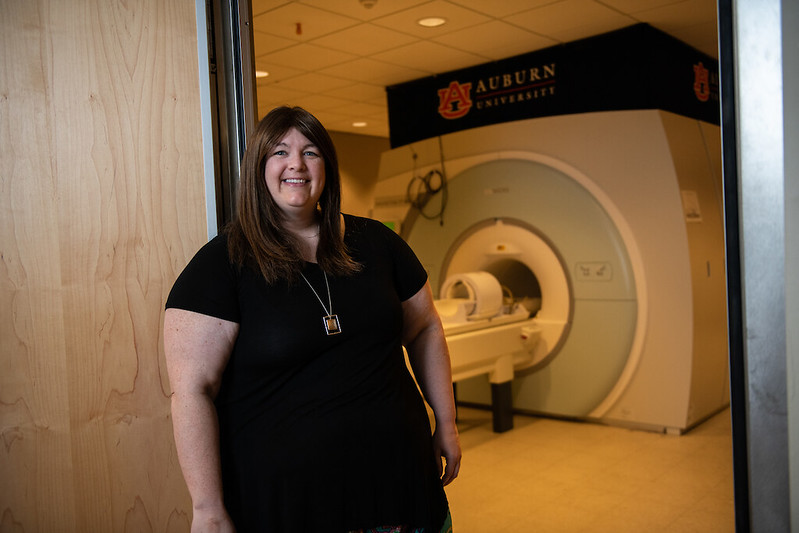Robinson discusses importance of sleep for positive mental, physical health in Expert Answers

Sleep is a billion-dollar industry, yet a good night’s sleep is elusive to many, especially during these trying times as the COVID-19 pandemic lingers. Auburn University Psychology Professor Jennifer Robinson and her team have discovered a wide assortment of side effects from a lack of sleep. In addition to impaired motor skills, sleep deprivation also negatively affects emotions, decision-making abilities and overall health.
We asked Robinson—director of the Cognitive and Behavioral Sciences Program—about what it takes to break out of the poor sleep cycle, what some of the long-term ramifications are from sleep degradation and what advice she has for some basic approaches to remedy the lack of shut-eye.
A recent study has shown that insufficient sleep, mental health issues and stress can give people symptoms consistent with head injuries and post-concussion syndrome. What are your thoughts on this, and what does it mean for us all after a mentally tiring year in 2020?
Sleep has and always will be a critical biological process that directly impacts our functioning on every level, whether it’s physiological, psychological or neurological. Even a single night of sleep can have pretty dramatic effects in each of these domains, so if you were to extend that sleep deficit for longer periods of time, the effects become more significant. To make things even more complicated, lack of sleep increases stress hormone production, and that impacts sleep, so it’s very easy for things to develop into a vicious cycle. Furthermore, both stress and sleep are intertwined with immune function. A robust immune system is dependent on a healthy lifestyle, with one of the most critical factors being sleep.
Can you speak to the importance of sleep for our overall well-being and specifically for the mental and physical aspects of health?
I think most experts would agree that getting consistent, high-quality sleep is the cornerstone to a healthy lifestyle. Sleep is restorative, meaning that it gives your body a chance to rebound, heal and to fight off any viruses. Sleep is also vital for healthy psychological functioning, both from a mental health perspective and also from a cognitive processing perspective. During sleep, our brains integrate information that we’ve acquired throughout the day, which is particularly important for students as it’s one of the most effective ways to form new memories and enhance learning. Several studies have shown that lack of sleep can impact our decision-making abilities, our ability to control our emotions, our ability to pay attention and our ability to react to a stimulus—such as one you may encounter on the road while driving. Chronic sleep deficiency has been linked to a number of mental health disorders, including anxiety, depression and post-traumatic stress disorder.
From a physical perspective, our bodies repair themselves during sleep. We know that sleep is an important factor in healing and repairing our cardiovascular system, in maintaining hormonal balance and in keeping our immune systems functioning at their best. If we don’t get adequate sleep, our bodies can’t fight off an infection as well. Lack of sleep also makes it difficult to maintain a healthy weight because it affects how our bodies react to insulin and hormones that signal whether we are hungry or full. Finally, chronic sleep deficiency has been linked to cardiovascular disease, kidney disease, diabetes and stroke.
The problems posed by the coronavirus pandemic have not magically disappeared with the calendar turning from 2020 to 2021, so what advice would you give to anyone who is feeling excess stress and physical or mental fatigue?
I think it’s incredibly important to establish a good self-care routine, especially when our schedules have been so uprooted, and the stressors are omnipresent. I think parents are especially prone to the overwhelming stress and sleep deprivation of the pandemic, given the seemingly impossible balance of fluctuating/unpredictable childcare with their full-time, work-from-home responsibilities. It’s easy to feel as though there are not enough hours in the day and to have sleep take the toll.
Some ways to increase sleep, or quality of sleep, would be to stick to a routine, pick a bedtime that you can stick to, unplug for at least 30 minutes before falling asleep, eat healthy foods—avoid processed foods—and get outside for at least 30 minutes a day (bonus points if you add in a walk or some sort of exercise). Most people reading this are probably aware of this information, though, so, I think the most helpful thing I can contribute would be to start with “micro habits.” Micro habits are just one-to-two-minute commitments to oneself, where you do something that makes you feel good. The idea is that you should always be able to commit to one-two minutes for you. That may mean listening to relaxing music, meditating, journaling or stretching for one-to-two minutes at the start of your day—or whenever you can fit it in. From there, you can either increase the time of your micro habit or add another micro habit. Keep the ones that “work,” ditch the ones that don’t.
Another good combatant to stress is to do a five-minute journal every morning where you write down three things that you are grateful for, three affirmations and three things that would make the day great. This can help set the stage for a positive mindset. At the end of the day, I also think it’s incredibly important to give yourself grace, because these are unprecedented times with unprecedented challenges.
What is your research telling you, thus far, about the connection(s) between sleep and mental clarity and/or cognition?
Our research has shown that even a single night of sleep deficiency can have a tremendous impact on how the brain works, even at rest when you aren’t engaged in any activity. Certain brain regions talk differently to each other. For example, the regions of our brains that control emotions have different connectivity patterns when you get a full night’s sleep, compared to when you only get four hours of sleep. We think that this contributes to how people tend to be overly emotionally reactive and make poor decisions when sleep deprived. Specifically, we think that these emotional centers “hijack,” if you will, the cognitive decision-making regions. We also noticed that during sleep deprivation, brain networks involved in perception were different, which may speak to how sleep alters the way we perceive and attend to things in our environment.
About Jennifer Robinson:
Jennifer Robinson is an associate professor in Auburn University’s Department of Psychological Sciences and director of the Cognitive and Behavioral Sciences Program. Robinson joined the Department of Psychology in 2012. Her research primarily involves using high-field functional magnetic resonance imaging, or fMRI, and psychophysiological techniques to investigate the interplay of emotions and cognition. She is heavily involved with the Auburn University MRI Research Center and holds appointments in the School of Kinesiology and the Department of Electrical and Computer Engineering.






